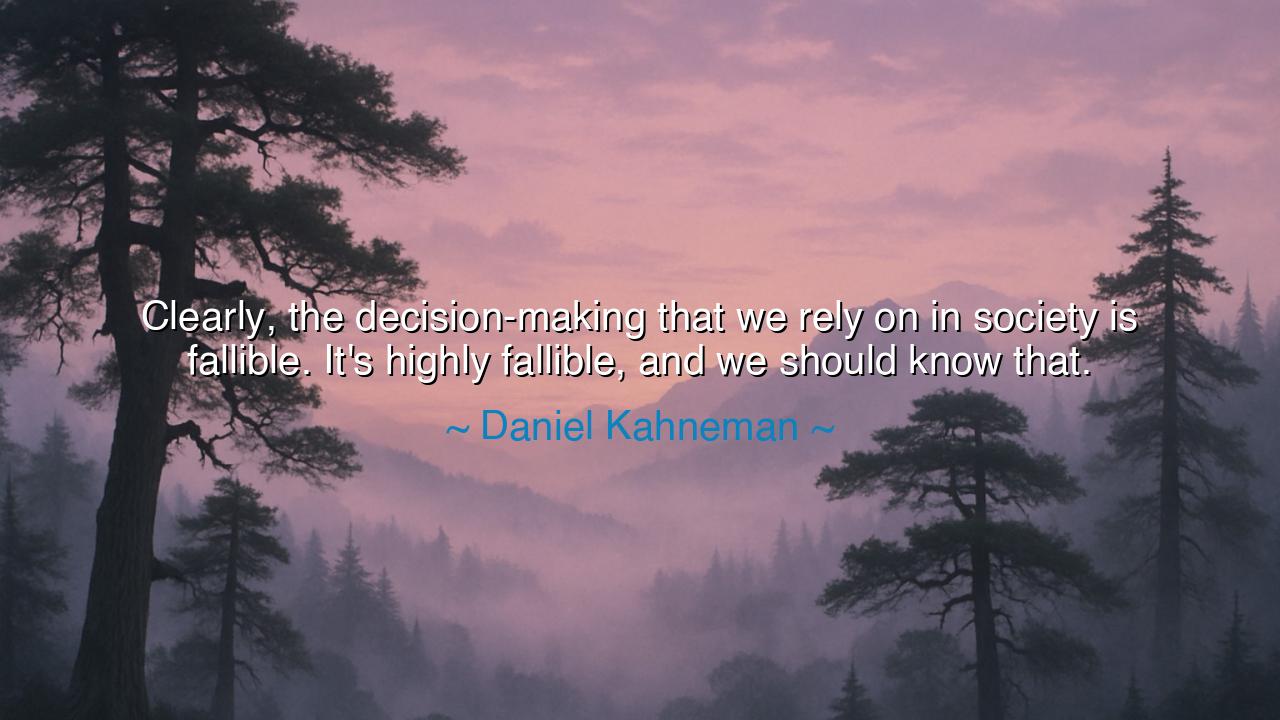
Clearly, the decision-making that we rely on in society is
Clearly, the decision-making that we rely on in society is fallible. It's highly fallible, and we should know that.






Hear the voice of Daniel Kahneman, the wise interpreter of the human mind, who declared: “Clearly, the decision-making that we rely on in society is fallible. It’s highly fallible, and we should know that.” These words, though spoken with calm clarity, cut deep into the heart of human pride. For they remind us that our judgments are not perfect, our reasoning is not unshakable, and the choices upon which whole nations are built are made by men and women who err, again and again.
The meaning is profound. Decision-making is the foundation of every action: in the councils of rulers, in the chambers of courts, in the marketplaces of trade, in the daily choices of ordinary people. Yet Kahneman, drawing from the wells of psychology and experience, warns that this foundation is fragile. Human beings are swayed by bias, by memory’s trickery, by the pull of fear and desire. What seems rational may be but an illusion, and what seems certain may crumble with time. To forget this truth is to build the house of society on sand.
History testifies to this in every age. Consider the fateful judgment of the Trojan elders, who looked upon the wooden horse at their gates. Their decision-making, clouded by hope of victory and weariness of war, told them it was a gift from the gods. They brought it within their walls, and in doing so sealed the fate of their city. Was their failure malice? No—it was the fallibility of human judgment. The ruin of Troy echoes across centuries as a warning that the errors of leaders can destroy nations.
Even in modern times, the same truth endures. The global financial crisis of 2008 was not born from evil intent alone, but from flawed decision-making—from misplaced confidence, from blindness to risk, from the failure to recognize that humans do not reason as gods, but as mortals prone to error. When governments, banks, and individuals ignored their own fallibility, they invited collapse. Kahneman’s words remind us that wisdom begins in humility: to know that even our greatest minds stumble.
Yet there is no despair in this teaching. For to know that decision-making is fallible is to arm oneself with vigilance. The wise man is not the one who never errs, but the one who admits his errors quickly, learns from them, and seeks counsel to balance his own bias. A society that accepts its fallibility builds safeguards: checks and balances, open debate, transparent institutions. By acknowledging weakness, it becomes strong; by admitting blindness, it begins to see.
The lesson for us is clear. Do not trust blindly in your own judgments. Question them, test them, seek the wisdom of others, especially those who see the world differently. Do not expect perfection in leaders, but demand systems that correct their errors swiftly. And in your personal life, remember: your decision-making will falter at times, but it need not define you. What defines you is how you respond when your judgment fails—whether with prideful denial or with humble correction.
Therefore, take practical steps: pause before great decisions, weigh your motives, and guard against the illusions of certainty. Invite voices that challenge you, for the adversary in counsel may save you from ruin. And above all, hold in your heart the humility that Kahneman offers: that to be human is to be fallible, but to be wise is to never forget it.
So let this truth be passed down: “Clearly, the decision-making that we rely on in society is fallible.” Accept this not as weakness, but as the path to vigilance and strength. For a people who know their frailty walk carefully, guard their steps, and endure. But a people who deny their fallibility are doomed to stumble blindly into the abyss. Let us choose humility, and in humility, build a future more enduring than pride can ever achieve.






AAdministratorAdministrator
Welcome, honored guests. Please leave a comment, we will respond soon